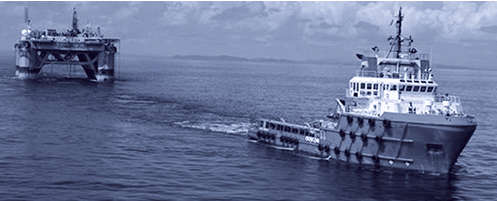 The Shipowners’ Club has always focused on smaller and specialist vessels and, as a consequence, has always had a very significant involvement in the offshore sector – currently covering 5, 000 vessels providing support services to offshore production and explorations facilities.
The Shipowners’ Club has always focused on smaller and specialist vessels and, as a consequence, has always had a very significant involvement in the offshore sector – currently covering 5, 000 vessels providing support services to offshore production and explorations facilities.
While it is difficult to establish our absolute market share, we believe we have entered in the Club around 40% of the worldwide fleet that are described as providing such services. With such a large number of vessels it is inevitable that we will experience a certain number of incidents, with vessels operating in close proximity to offshore structures and around sub-sea infrastructure.
To an extent, the contract conditions under which operations take place have provided a degree of protection from claims being brought against owners, by virtue of knock for knock conditions, but we have been concerned more recently that owners are being requested to agree to provide indemnities in respect of damage that is caused to offshore property, sometimes to only modest limits, but we are also seeing contracts with huge, and in some cases, unlimited exposure for damage caused.
The premiums we have charged historically have always assumed that a degree of protection should be available under the contract but increasingly, and in certain jurisdictions, that protection is being eroded.
As a mutual insurer we do not seek to achieve an underwriting profit but we should always aim to ensure a balance between the premium generated and the quantum of claims that are paid. In certain sectors to the offshore sector we are seeing this balance threatened with claims being brought for damage that might historically have been repaired as part of the ongoing offshore maintenance program. With the reduction in the oil price we understand that in some offshore sectors maintenance budgets have been slashed and claims are being brought against the offshore Members whose vessels have allegedly caused damage. We have also witnessed some new contracts being awarded that also contain less favourable indemnity provisions breaking away from the more traditional knock for knock system that we have always worked to in the past.
With these ever challenging market conditions it has never been more important that Members focus on good risk management. We have undertaken some analysis on some of the larger offshore claims that we have experienced over the last few years and produced the attached case studies. It is usual that the cause of contact damage is attributable to human error but in many cases these might have been avoided by having more rigorous procedures in place and a system of audit to ensure that procedures are routinely followed. In certain jurisdictions where we have seen the introduction of less favourable contract conditions it is a important that owners do not push the limits in undertaking hazardous operations in unsuitable weather conditions. Masters and crew need to know that it is acceptable practice to refuse to undertake an operation if it will put the vessel or offshore facility at risk.
Clearly if an owner is liable, for example, for the first US$ 25million of damage to a rig they should not be operating in close proximity when the weather conditions are such that contact with that rig is likely. Under a traditional knock for knock regime, provided there is no adverse risk to the vessel, less caution might perhaps be exercised.
We hope these case studies will assist in highlighting some of the causes of incidents that we have experienced and in each case we detail the cost of the claims that resulted. We hope that Members will consider these incidents in the context of the operations that they undertake and the risk management framework/procedures that they have in place for their own operations. Our objective here is to seek to minimise the number of incidents that occur, particularly at a time when we are witnessing the emergence of contract conditions that are less favourable and offshore field operators are looking for additional means of subsidising their maintenance budgets.
We are well aware that the majority of our Members are cognisant of these challenges and successfully refuse to operate under these revised contracts, maintaining the highest levels of risk awareness in their day to day operations. We are however more than happy to provide more assistance if required and as such please contact the Club, either in London or Singapore and we will be happy to help.





